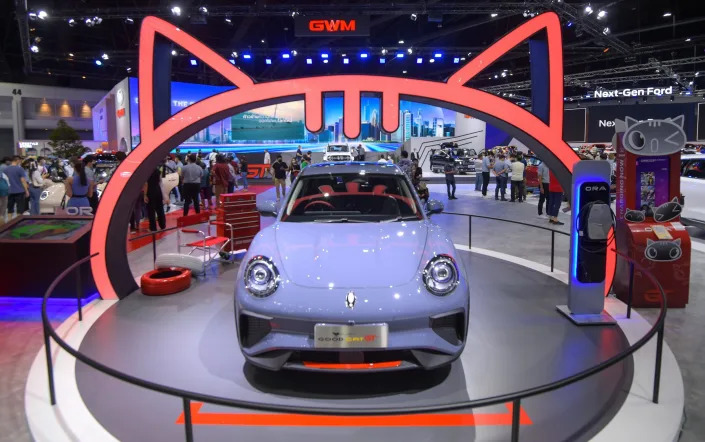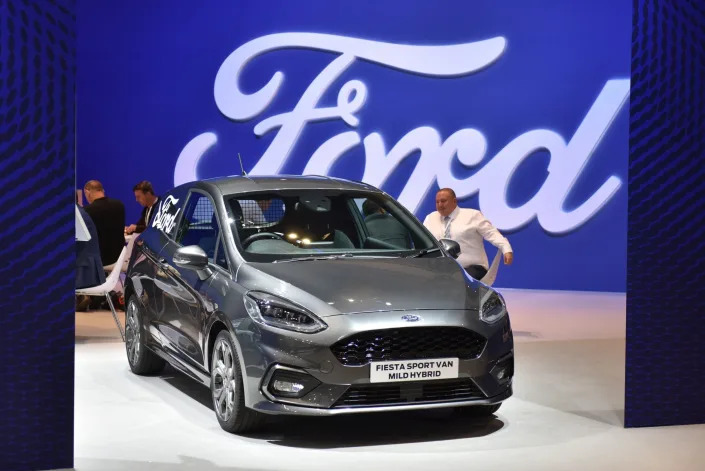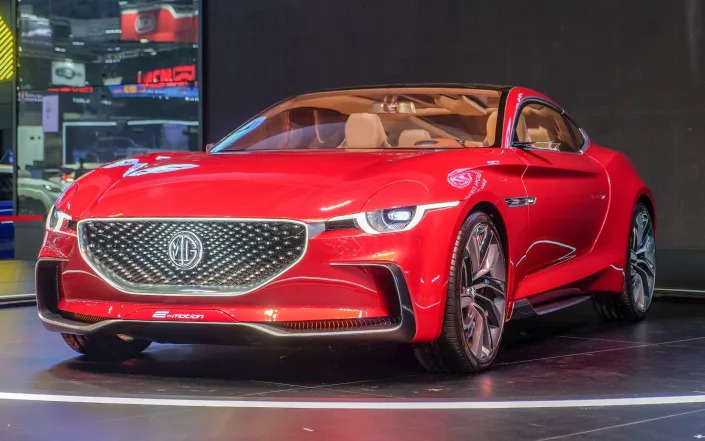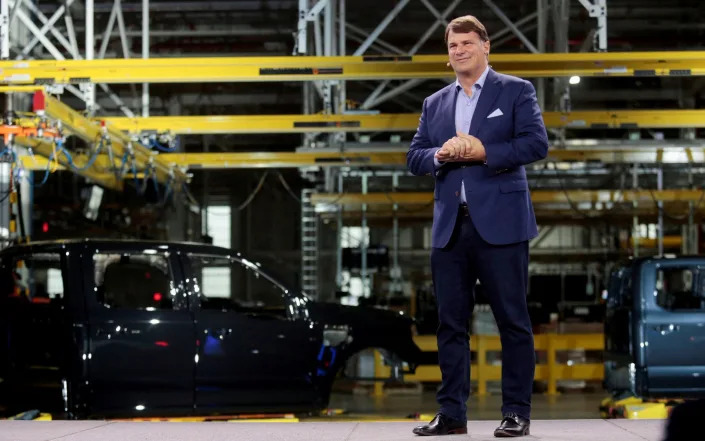Chinese carmakers line up for 'phenomenal opportunity' in the UK
Howard Mustoe
Sat, January 28, 2023
Howard Mustoe
Sat, January 28, 2023
HELLO KITTY KAR

ORA Good Car GT electric vehicle displayed during the 43rd Bangkok International Motor Show - NurPhoto
Few cars manage to attain the name recognition of the Fiesta, Ford’s cheap, reliable runabout in which millions of Britons learned to drive.
But after sales of 4.8 million in the UK alone, the American car maker has called time on the model. Production is to end this year after almost 50 years after its debut.
The withdrawal creates a gap at the bottom of the market as more and more car makers ditch cheaper models in favour of pricer – and more profitable – SUVs. Yet nature abhors a vacuum and there are already new manufacturers lining up to take the place of the old guard. The vast majority are from the same country: China.
Up to 30 new electric vehicle brands are eyeing up the UK car market, according to an industry report seen by The Telegraph, with most of them Chinese.
Challengers have designs on the cheaper end of the market, preparing to sell mass market battery-powered cars to Britain.
Companies like BYD and Ora, which already have agreements in place with UK dealers, will be joined by a raft of other car makers including Chery, Dongfeng and Haval. They are big brands in China but virtually unknown to British buyers.

Ford Fiesta - John Keeble/Getty Images Europe
“My read of the Chinese is they are very, very excited about the UK market,” says Mark Raban, the boss of Lookers, one of the top UK car dealers.
Lookers will soon begin selling cars from BYD, which is backed by billionaire US investor Warren Buffett. The company only started making cars in 2003 but already has a 17pc market share of electric vehicle sales in China.
As well as the cars themselves, BYD also manufactures the batteries that go in them. This will be of growing importance as rising demand for batteries across the world puts pressure on supply.
“I think we're going to see some very, very competitive pricing,” says Raban.
China’s car market is the biggest in the world but sales growth is slowing, in-line with the broader economy. As a result, domestic automakers are now looking to export.
Britain is an obvious target: the UK recently reclaimed its place as the second-biggest European market, behind Germany, and the Chinese car industry already has well established links here.
MG, for instance, is now one of the fastest-growing car brands in the UK, passing Citroen, Honda, Renault and Skoda. While a British marque, MG has been Chinese owned since 2005.
As The Telegraph revealed last month, MG plans to expand electric car sales further in the UK, seeing “a significant opportunity” in the country.

ORA Good Car GT electric vehicle displayed during the 43rd Bangkok International Motor Show - NurPhoto
Few cars manage to attain the name recognition of the Fiesta, Ford’s cheap, reliable runabout in which millions of Britons learned to drive.
But after sales of 4.8 million in the UK alone, the American car maker has called time on the model. Production is to end this year after almost 50 years after its debut.
The withdrawal creates a gap at the bottom of the market as more and more car makers ditch cheaper models in favour of pricer – and more profitable – SUVs. Yet nature abhors a vacuum and there are already new manufacturers lining up to take the place of the old guard. The vast majority are from the same country: China.
Up to 30 new electric vehicle brands are eyeing up the UK car market, according to an industry report seen by The Telegraph, with most of them Chinese.
Challengers have designs on the cheaper end of the market, preparing to sell mass market battery-powered cars to Britain.
Companies like BYD and Ora, which already have agreements in place with UK dealers, will be joined by a raft of other car makers including Chery, Dongfeng and Haval. They are big brands in China but virtually unknown to British buyers.

Ford Fiesta - John Keeble/Getty Images Europe
“My read of the Chinese is they are very, very excited about the UK market,” says Mark Raban, the boss of Lookers, one of the top UK car dealers.
Lookers will soon begin selling cars from BYD, which is backed by billionaire US investor Warren Buffett. The company only started making cars in 2003 but already has a 17pc market share of electric vehicle sales in China.
As well as the cars themselves, BYD also manufactures the batteries that go in them. This will be of growing importance as rising demand for batteries across the world puts pressure on supply.
“I think we're going to see some very, very competitive pricing,” says Raban.
China’s car market is the biggest in the world but sales growth is slowing, in-line with the broader economy. As a result, domestic automakers are now looking to export.
Britain is an obvious target: the UK recently reclaimed its place as the second-biggest European market, behind Germany, and the Chinese car industry already has well established links here.
MG, for instance, is now one of the fastest-growing car brands in the UK, passing Citroen, Honda, Renault and Skoda. While a British marque, MG has been Chinese owned since 2005.
As The Telegraph revealed last month, MG plans to expand electric car sales further in the UK, seeing “a significant opportunity” in the country.

MG - Chiradech Chotchuang/Alamy Stock Photo
China's Geely is also preparing to pump more investment into London Electric Vehicle Company, which makes electrified London black cabs and battery-powered vans. Geely hopes to turn the company into a “high volume” manufacturer of electric vehicles, Reuters reported.
Sales of electric vans have already proved popular with customers, according to recently filed accounts from the Warwickshire company.
Promised investment such as this raises the hopes that the Chinese push into the car market could help Britain reach its target of producing 2 million cars a year.
To do so, it will need new factories, probably owned by companies not yet producing here, the industry’s lobby group says.
If China wants to sell here, could it also bring jobs and production lines, returning affordable car production to Britain?
Prof David Bailey, a car industry expert at Birmingham University, is sceptical.
“I think they may go to Central Europe, where labour costs are low. You know, what is the UK doing to be an attractive place to set up operations?”
The US has laid out a tax bonanza worth hundreds of billions of dollars that is currently hoovering up investment in green vehicles and has already lured away startups such as electric van maker Arrival. The EU is considering a similar scheme.
“We're squeezed between these two really big blocs that are putting in a big amount of effort to make this happen,” says Bailey.
For Lookers’ Raban, though, the arrival of a wave of affordable Chinese cars is a “phenomenal opportunity” for his business.
New brands could take 10pc of the UK EV market by 2025 and 18pc of it by 2030, industry researchers estimate.
Playing into Chinese manufacturers’ hands is the fact that others are retrenching as they look to expand.

Jim Farley - Rebecca Cook/Reuters
Last week it emerged that Ford is to cut 3,200 jobs across Europe as it shifts its focus from cheaper petrol cars to more lucrative electric ones.
Familiar carmakers are abandoning cheaper models to sell larger SUV-style motors and higher-spec cars in order to make best use of restricted parts supplies.
Ford is focusing on models like its £50,000 electric Mustang. It joins brands like BMW and Mercedes which have both openly said that cheaper cars are no longer for them.
Not all have abandoned the entry-level car: Nissan has increased production of its Qashqai by 16.5pc, helping it displace the Vauxhall Corsa as Britain’s best-selling car last year.
However, Nissan’s Qashqai starts at £26,000, a far cry from the £16,000 a Fiesta could be bought for just before the pandemic.
In starting at the bottom of the market, Chinese manufacturers are taking a leaf out of Nissan’s book. When the Japanese company entered the UK, it did so first under the guise of its mass market Datsun, which undercut the competition. Over time, it moved up the ladder to introduce pricer, higher-specification models.
For companies like Ford, moving into the crowded, more expensive end of the market, jostled by cost-cutting Chinese brands, may not end well for them, says Prof David Bailey, a car industry expert at Birmingham University.
“There’s no guarantee any will survive,” he says. “And it's those that make the shift to electric vehicles, quickly, efficiently, and are able to get their costs down; they will be the ones that survive.”
Whatever the outcome, Chinese challengers will be arriving alongside European, US and Japanese models in sales lots soon. And for buyers looking for an affordable everyday run-around, they may increasingly be the only options.
Ford is focusing on models like its £50,000 electric Mustang. It joins brands like BMW and Mercedes which have both openly said that cheaper cars are no longer for them, though Ford points out that despite the Fiesta's sales decline it was still a top-10 car last year and is joined by the Puma and Kuga in the best-seller list.
No comments:
Post a Comment